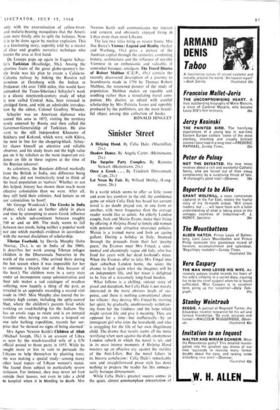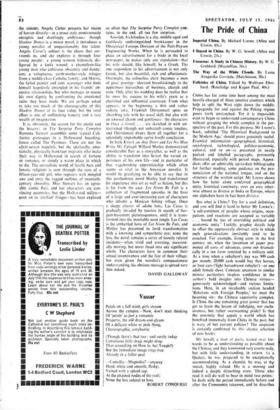Sinister Street
A Helping Hand. By Celia Dale. (Macmillan, 21s.)
Shadow Dance. By Angela Carter. (Heinemann, 21s.)
The Surprise Party Complex. By Ramona Stewart. (Heinemann. 21s.) Once a Greek . . . By Friedrich Diirrenmatt. (Cape, 21s.) Let Noon Be Fair. By Willard Motley., (Long- mans, 28s.) IN a world which seems to offer so little room and even less comfort to the old, the confidence game on which Celia Dale has based her current novel is no doubt played out, in one form or another, with more frequency than the average reader would like to admit. An elderly London couple, Josh and Maisie Evans, make their living by offering A Helping Hand to lonely old women with pensions and attractive insurance policies. Maisie is a trained nurse and Josh an ageing gallant. During a holiday in Italy, financed through the proceeds- from their last 'paying guest,' the Evanses meet Mrs Fingal, a senti- mental and charmingly vague old lady, who has lived for years with her dead husband's niece. When the Evanses offer to take Mrs Fingal into their suburban London home, she seizes the chance to lead again what she imagines will be an independent life, and her niece is, delighted to be free of a tiresomely long-lived burden.
What follows is a chilling, sinister story of greed and deception. but Celia Dale is not merely interested in the more obvious levels of sus- pense, and there is nothing conventional about her villains: they destroy Mrs Fingal by starving her spirit, by gradually, unobtrusively withdraw- ing from her the kindness and the hope which might sustain life and give it meaning. They are opposed for a time—but ineffectually—by an immigrant girl who joins the household, and who is struggling for the life of her own illegitimate child. The drama that results seems all the more terrifying when seen against the drab, anonymous London suburb in which the novel is set, and in its most intense moments A Helping Hand musters up an effective cry against the sterility of the Anti-Lifers. But the novel falters in its bizarre conclusion : Celia Dale's remarkably sure and straightforward prose style has done nothing to prepare the reader for this unneces- sarily baroque denouement.
While Celia Dale's greatest success comes in the quiet, almost commonplace presentation of the sinister, Angela Carter presents her vision of horror directly—in a prose style omnivorously energetic and dazzlingly ambitious: though Shadow Dance is a minor novel, it introduces a young novelist of unquestionably fine talent. Angela Carter's subject is the chaos that sur- rounds us, and she explores it through four young people: a young woman hideously dis- figured by a knife wound: a chameleon-like young man who cultivates obscenity and dandy- ism; a voluptuous, earth-mother-style refugee from a middle-class Catholic family: and Morris, the failed painter and junk scavenger who finds himself hopelessly entangled in his friends' ob- sessive relationships, but who manages to rescue his own dignity by confronting the emotional ruins they have made. We are perhaps asked to take too much of the choreography of this Shadow Dance at its face value, but the total effect is one of unflinching honesty and a rare wealth of imagination.
It is, obviously, the season for the exotic and the bizarre: in The Surprise Party Complex Ramona Stewart assembles some typical Cali- fornia grotesques in a Hollywood boarding- house called The Pyrenees. These are not the silver-screen hopefuls, but the spiritually, emo- tionally, physically bankrupt migrants w'ho4make their way to Hollywood in search of fortune or romance, or simply a warm place in which to die. The surrealistic world of health bars and lunatic religions is seen through the eyes of a fifteen-year-old girl, who registers with mingled awe and envy the ragged outlines of twentieth- century absurdity. Miss Stewart has an agree- able comic flair, and her characters are con- vincing eccentrics, but the Hollywood milieu— even on its 'civilian' fringes—has been explored so often that The Surprise Party Complex con- tains, in the end, all too few Surprises.
Arnolph Archilochos is a shy, middle-aged and faultlessly undistinguished bookkeeper in the Obstetrical Forceps Division of the Petit-Paysan Engineering Works. When he is persuaded to place an advertisement for a bride in the local newspaper, he makes only one stipulation—that his wife should, like himself, be a Greek. The one respondent to his advertisement is not only Greek, but also beautiful, rich and affectionate. Overnight, the colourless clerk becomes a man of great prestige--elevated breathtakingly to the uppermost hierarchies of business, church and state. Only after his wedding does he realise that he owes his success to his wife's years as a cherished and influential courtesan. From what appears, in the beginning, a thin and rather sadistic joke, Friedrich Dfirrenmatt spins an absorbing tale with his usual skill, but also with an unusual charm and gentleness: the characters in Once a Greek . . . are sketched in with un- restrained (though not unbaited) comic touches, and Dfirrenmatt draws them all together for a splendidly improbable opera baulk conclusion.
In both Knock on Any Door and Let No Man Write My Epitaph Willard Motley demonstrated considerable flair as a storyteller, as well as the ability to transform into fiction the varied ex- periences of his own life—and in particular of that vagabonding apprenticeship which often seems so vital to the American novelist. It would be gratifying to be able to say that in this posthumous novel Motley had transformed his experience into art as well as fiction, but this is far from the case. Let Noon Be Fair is a collection of fragmented episodes in the lives of a large and ever-increasing cast of characters who inhabit a Mexican fishing village. Once a sleepy cluster of adobe huts, Las Casas is gradually invaded by tourists in search of bar- gain-basement picturesqueness, until it is trans- formed into the inevitable neon jungle. Las Casas is the embattled hero of Let Noon Be Fair, and Motley has presented its lurid transformation with a knowing and sympathetic eye; none the less, the novel remains a series of loosely related incidents—often vivid and arresting, occasion- ally moving, but never fused into any significant whole. The characters have in common their sexual inventiveness and the fate of their village, but even given the novelist's compassionate understanding, his obvious message is spread very thin indeed.
DAVID GALLOWAY































 Previous page
Previous page